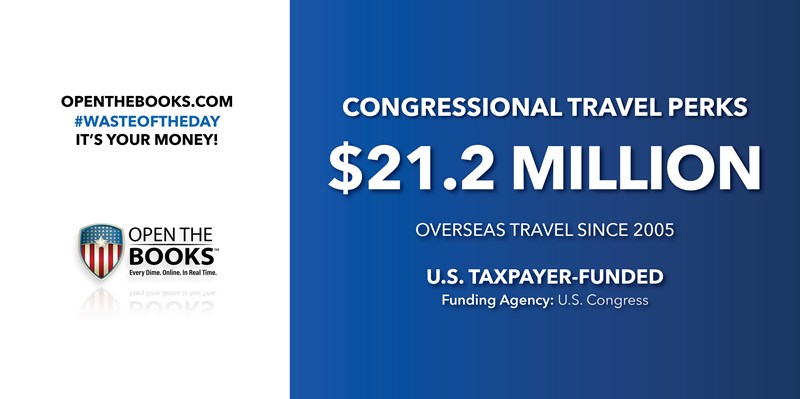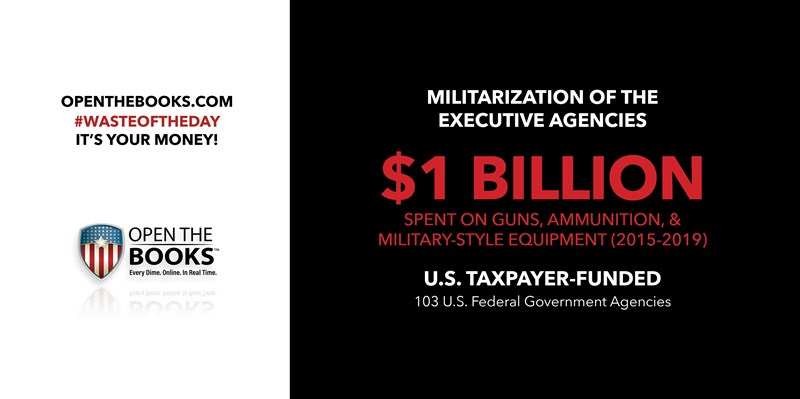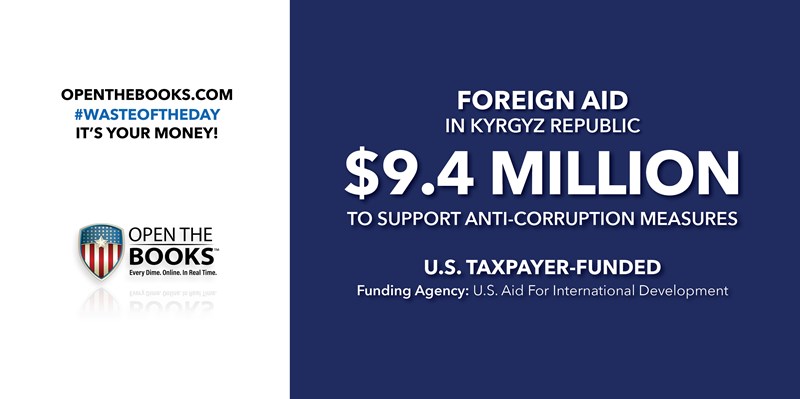
Congress Spent $21.2 Million on Their Own Overseas Travel Since 2005
April 12, 2021

As workplace perks come, free travel to anywhere in the world is one of the better ones.
While it is hard to envision your employer covering a trip to Israel, United Kingdom, France, Germany or United Arab Emirates, members of Congress get exactly that.
Between 2005 and 2018, members of Congress and their committee staffers took 16,367 trips, with those countries being the top destinations.
Our auditors at OpentheBooks.com looked at congressional travel from 2005 to 2019, and last year we issued a report titled “Congressional Membership Has Its Privileges” on the various perks.
We did not pull data on congressional travel expenses for 2020, as worldwide travel was disrupted by the Covid-19 pandemic.
Members of the House of Representatives are limited to 60 consecutive days for official travel to other countries with their costs reimbursed upon their return and leadership approval. Senate members have no limit to the length of their permitted official travel.
In 2019, the House spent $4.3 million on overseas travel, including on the one-week trip to Australia that Rep. Ed Perlmutter (D-CO) took for $23,000.
Rep. Frank Pallone (D-NJ) spent $75,000 on an 11-day trip to Italy, Morocco and France, while Rep. Richard Hudson (R-NC) spent $14,357 on a one-week trip to Germany, Niger, Nigeria, Mali and France.
Congress-sanctioned and paid for voyages are not limited to members. Committee staffers also get to travel.
Three House Appropriations Committee staffers flew to Mozambique and Malawi during a seven-day trip, costing $54,600, or $18,200 per person.
Five staffers of the House Armed Service Committee flew to Japan and Australia during a five-day trip, costing $103,493, or $20,698 per person.
You tax dollars at work.
$10.1 Million Funding Remedial Education in Africa and Europe During On-going Pandemic
April 13, 2021

The U.S. Agency for International Development is offering $10 million to fund remedial education for grades three to five in the landlocked African country of Zambia.
In addition, the U.S. State Department is funding $150,000 for media literacy training for the general population of Romanian and Russian speakers in the Eastern European country of Moldova.
While the need for such funding in other countries may be evident, American students are struggling.
In the United States, learning has been interrupted, development delayed and there is a gap in access to technology needed for online learning.
Students fell behind in math during the pandemic, according to a report from Northwest Evaluation Association, a not-for-profit that administers standardized tests.
NWEA analyzed data from almost 4.4 million students in grades 3-8 last fall that showed students have fallen behind in math, as reported by the Associated Press.
Compared to 2019, students scored an average of 5 to 10 percentile points lower in math, the NWEA report found.
That does not include minority and poor students who were mostly missing from the 2020 testing, opting out because they stopped going to school or did not have access to reliable technology while learning at home, the NWEA said.
Is sending $10 million to other countries for their education while our students are struggling the best way to spend taxpayer money?
76 Non-Military, Non-Law Enforcement Federal Agencies Stockpile Weaponry
April 14, 2021

Last week, President Joseph Biden expressed his interest in gun control by directing the Department of Justice to take several steps to prevent more mass shootings, while his own federal agencies continue to stockpile guns and ammunition.
Critics contend he is far too interested in limiting gun access to regular Americans while federal administrative and regulatory agencies continued stockpiling hundreds of thousands of guns.
Our auditors at OpenTheBooks.com published details about non-military use of weapons in our report earlier this year “Militarization of the U.S. Executive Agencies,” looking at the last two years of President Barack Obama’s administration and the first three years of President Donald Trump’s administration.
We showed that almost $1 billion was spent on guns, ammunition, and military-style equipment in the 103 federal agencies outside of the Department of Defense between 2015 and 2019, the latest year available.
Of that spending, $110.6 million was divvied up among 76 non-law enforcement, administrative agencies and spent on guns, ammunition and military-style equipment between fiscal years 2015 and 2019.
For example, the Internal Revenue Service, Environmental Protection Agency, Social Security Administration, and many others were found to have spent taxpayer money on weapons.
Furthermore, there are more than 200,000 non-DOD federal employees with firearms, greater than the 186,000 U.S. Marines, we found.
Biden opened the door to private-use gun control. It seems hypocritical when compared to the federal non-military, non-law enforcement agencies – that are amassing large quantities of weaponry and ammunition.
Remembering Solyndra – A $524 Million Green Energy Failure
April 15, 2021

Throwback Thursday!
Considering President Joseph Biden’s $2.3 trillion infrastructure plan, Americans should first review the taxpayer money that was spent on projects in 2009 and learn from the ones that were massive failures.
Biden asked Congress to invest $35 billion in green energy leadership to see “technology breakthroughs that address the climate crisis and position America as the global leader in clean energy technology and clean energy jobs,” according to the White House fact sheet.
But look as recently as 2009, when Congress passed the the American Recovery and Reinvestment Act during President Barack Obama’s administration.
That $831 billion spending package made lots of promises, including to save jobs and create new ones, but waste — and possibly some fraud — tainted the outcomes.
Often referenced as a what-not-to-do in stimulus financing, solar panel start-up Solyndra cost taxpayers $570 million.
The company received $535 million in loans from the 2009 stimulus and a $25 million tax break from California's agency for alternative energy.
Solyndra said it would use the $535 million to invest in generating solar energy.
But a report from the Inspector General’s Office later found that the company misled the U.S. Department of Energy in its application and that the department did not manage and approve Solyndra’s loan guarantee properly.
In 2011, Solyndra filed for bankruptcy, laid off its 1,100 employees and ended its operations.
About six months before closing shop, the company also received $10.3 million in long-term credit from the U.S. Export-Import Bank for its exports to Belgium.
To prevent a repeat, the American public and Congress should ask questions of Biden’s recent proposal, vet the companies and projects, get bipartisan support, and then audit “every dime” of the spending on the projects.
Foreign Aid — $9.4 Million to Kyrgyz Republic for Anti-Corruption, Good Government Efforts
April 16, 2021

The federal government has allotted $9.4 million to support rule of law and anti-corruption activity in the Kyrgyz Republic.
The funds will go “to strengthen the transparency and accountability of the judiciary and other key government institutions,” the grant listing says.
Formerly a member of the Soviet Union, Kyrgyzstan is a landlocked country in Central Asia with 6.5 million people, slightly less than the population of Indiana.
The American money would be used to “strengthen the judiciary, strengthen justice and legal services to address legal problems, resolve disputes, and protect fundamental rights and thus close the justice gap,” among other things.
The goals sound noble, “ensuring that the systems and services are more responsive to the population as a whole” and strengthening “open government policies and the delivery of services across sectors in a more transparent, accountable, and citizen-responsive manner.”
But that $9.4 million could be used here to address our many domestic problems, not the least of which is the billions in unemployment fraud that scammers have perpetrated.
An estimated $700 billion in unemployment benefits have been paid since the beginning of the pandemic and 10% of those benefits were fraudulently claimed, according to the U.S. Department of Labor.
It is the biggest public fraud in the history of the USA – between $70 billion and $200 billion stolen by criminals, con-artists, and crime syndicates.
The billions of dollars in defrauded unemployment benefits hits hard when the country is trying to get back to “normal.”
So, one wonders whether sending $9.4 million to help the Kyrgyz Republic battle corruption – when we haven’t rooted out domestic corruption – is the right move now.
The #WasteOfTheDay is presented by the forensic auditors at OpenTheBooks.com.